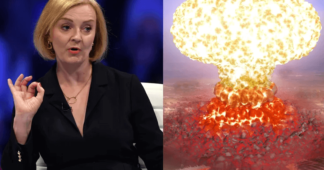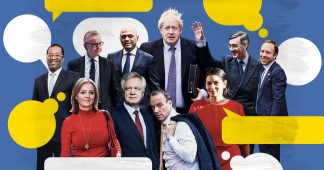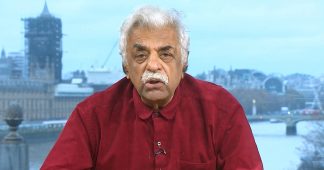Rishi Sunak is the man the markets trust
BY Thomas Fazi
Oct 24, 2022
In the days following her resignation, the British media appeared to be united in its verdict on Liz Truss: the 44-day premiership was the shortest and most catastrophic in British history. Support for the Conservative Party has plummeted to its lowest level in polling history; many wonder if the party will ever recover.
Yet we should be wary of resorting to the simplistic narrative of events which would have us believe that Truss and Kwarteng’s attempts to push through a “fiscally irresponsible” tax-cutting free-market agenda spooked financial markets, “crashed the economy”, and ultimately forced them to admit defeat and back down. Things are a little more complicated.
On one level, this is a story about the influence of neo-Thatcherite think tanks. The Adam Smith Institute and the Institute for Economic Affairs (IEA) have both found fertile ground for their ideas among certain Tories in recent years, after being relegated for so long to the fringes of political discourse.
A number of these organisations provided much of the inspiration for Truss and Kwarteng’s agenda — especially with regard to their proposed cuts to high-income and corporation taxes. Mark Littlewood, director general of the IEA, has described how he worked “hand in glove” with Truss to help her set up in 2011 the Free Enterprise Group, a faction of Tory MPs committed to radical free-market economics. Kwarteng was an early member. According to Littlewood, Truss has spoken at more IEA events than “any other politician over the past 12 years”, while her economic advisor and senior special advisor both have ties to the organisation.
But their influence isn’t the whole story. The truth is that Conservative MPs and party members, who are disproportionately middle or upper-class men from the wealthier postcodes in the south of England, tend to hold rather liberal views when it comes to the economy. They’re the ones who voted for Truss over the more interventionist Rishi Sunak.
The problem for the party is that this refurbished brand of free-market economics — or “Trussonomics” — was unpopular among all voters, and especially among the working-class, low-income and northern constituencies that three years ago voted Conservative. These are the ones who voted Tory for the first time in 2019: to get Brexit done, take back control of Britain’s borders, and level-up the country — not to roll back the state, slash taxes on the rich, and cut back public services.
The more controversial measures in Truss’s mini-budget were deeply unpopular: only 12% of voters supported scrapping the cap on bankers’ bonuses; only 11% supported abolishing the top rate of income tax for high-earners; and only 19% thought it was a good idea to cancel the planned increase in the corporation tax.
It suggests the Tory leadership completely underestimated the extent to which their voter base has shifted to the “Left” on economics. One recent poll, for example, shows that a majority of Conservative voters support public ownership of key services and utilities — including water, energy, rail, Royal Mail, and the NHS. Hoping to compensate for unpopular economic policies with a bit of faux nationalism and cultural conservatism isn’t going to cut it.
So aside from all the conjectures about who really influenced Truss, her downfall highlights a much more fundamental problem: the disconnect between the party’s membership and the sensibilities of the majority of their voters, especially in light of the Brexit realignment. In many ways, the party has become the victim of its own internal logic, much as Labour’s own contradictions — the overwhelmingly cosmopolitan outlook of its members — ultimately prevented Corbyn from adopting a coherent Brexit strategy.
But the sighs of relief and the smug commentaries, especially on the Left, about Truss’s attempted and failed “free-market coup” ignore an equally important development: that Truss’s political project, as unpopular as it may have been, wasn’t defeated by the people — but by the establishment.
The truth is that Truss and Kwarteng, and their free-market ideologues, were also waging their personal battle against economic orthodoxy and its technocratic gatekeepers — the Bank of England, the Treasury and the Office of Budget Responsibility. These hugely powerful and largely unaccountable institutions have always been the guardians of fiscal orthodoxy. First, they helped successive Conservative governments enforce a decade of devastating austerity. And then, ever since the end of the pandemic, they have been calling for a return to austerity in order for the UK to “balance the books”.
Truss and Kwarteng, for all their faults, dared to challenge the orthodox austerity narrative. Echoing Keynes of all people, they hit out at “Treasury thinking” — that is, the obsessions for balanced budgets and fiscal discipline — and spoke of the need to review the Bank of England’s remit. When asked about how the government was going to tackle the growing debt, shortly after Truss’s election, Julian Jessop, an IEA fellow and one of Truss’s economic advisors, explained: “The Treasury has been too quick to believe you need to start paying the debt down by raising taxes, both personal and corporate taxes,” he said. “Far better to let the deficit take the strain. If tax cuts do mean more borrowing in the short term, I’m completely relaxed about that.”
This approach was made clear as soon as Kwarteng arrived at the Treasury: his first decision was to sack its top official, Tom Scholar, who was considered to be too fiscally conservative and deferential towards the Bank of England. The message was clear: the new government expected civil servants — and indeed the Bank of England itself — to work for the executive, not against it.
Presumably, our free-marketeers Truss and Kwarteng railed against the orthodoxy so that they could cut taxes for the wealthy without having to worry about a rising deficit. And, in principle — and even though morally it’s contemptible — they were absolutely right: an advanced country such as the UK that issues its own currency should have no reason to worry about a rising deficit or debt.
They were also absolutely right, in principle, in reaffirming the primacy of politics over technocracy. Indeed, these are preconditions for the pursuit of truly democratic and economically progressive policies, especially when they threaten powerful vested interests in society. After all, it’s Truss and Kwarteng’s relaxed approach to deficit-spending that allowed them to approve a two-year energy price guarantee worth £60 billion, by far the biggest commitment in the mini-budget.
Challenging the economic orthodoxy, and the technocratic apparatuses that wield the true power in our societies, was the real Truss/Kwarteng sin. This — not the tax cuts, which were trivial from a macroeconomic perspective — is ultimately what brought down the wrath of the entire Transatlantic establishment: not only the Bank of England, the media and legions of orthodox economists, but also, and highly unusually, the IMF and even the US Treasury Secretary, Janet Yellen. There’s nothing more anathema to the establishment than the idea that democratically elected governments should have the final say over economic policy, not unaccountable institutions where decisions are taken behind closed doors.
But despite all the hysteria, the reality is that the British economy never “crashed”; there was a small drop in the value of the pound and rise in bond yields — the result of financial markets attempting to profit from the chaos — that was rapidly reversed to pre-panic levels by the Bank of England’s intervention. If anything, the problem was the Bank of England’s announcement that the intervention would be short-lived — possibly to put pressure on the Government.
Ultimately, the government wasn’t taken down by “the markets”, but by its own weakness, since neither Truss nor Kwarteng possessed the intellectual and political tools, nor the popular support, to ignore the hysteria and stick to their guns. While their political project might have seemed cruel, especially from an economically progressive perspective, there’s no reason to rejoice in its defeat, insofar as it has led to a complete restoration of the economic orthodoxy and technocratic rule, symbolised by Kwarteng’s replacement by Jeremy Hunt — or “Jeremy Draghi”, as his admirers have already dubbed him in honour of Mario Draghi — and then by the Second Coming of Sunak.
The fact that Hunt’s first decision was to completely overhaul the mini-budget’s main proposal — the energy price freeze — by reducing the measure’s duration from two years to six months, while announcing more budget cuts in the near future, which will cause millions to suffer even more than they would have under the previous plan, should cause everyone on the Left to reflect on the wisdom of joining in on the Kwarteng-bashing.
The consequences will be felt for a long time to come, in the form of an established wisdom that democracy ultimately has to conform to what the markets say — or else. We are already seeing this narrative crystallising in claims that the Tories should vote for Sunak because he’s “the man the markets trust”. This line of thinking is the death of democracy. Which is why the decision to support this bloodless coup will come back to haunt Labour: even if they win the next election (which seems likely), it’ll be the markets and technocratic establishment calling the shots. Not because they’re omnipotent, but because Labour has helped convince everyone that they are.
We remind our readers that publication of articles on our site does not mean that we agree with what is written. Our policy is to publish anything which we consider of interest, so as to assist our readers in forming their opinions. Sometimes we even publish articles with which we totally disagree, since we believe it is important for our readers to be informed on as wide a spectrum of views as possible.











